- Home
- Linda Newbery
Girls on the Up Page 2
Girls on the Up Read online
Page 2
“But they’re Chelsea people. I don’t want them thinking I’m a complete square.”
“So you’d rather they think you’re a thief? They’ve probably seen Anne Rutherford wearing it. And Mum and Dad know it’s not yours. They won’t let you.”
“Oh, don’t be boring!” Lovingly, Prune stroked the jersey fabric over her hips.
“I’m just saying.”
“Oh well, I’ll have to get something in the King’s Road,” said Prune, cheering up. “All those fantastic shops, just round the corner! There’s Just Looking, and Bazaar, and Top Gear, and it’s not far to the Chelsea Cobbler and Biba and Bus Stop – oh, I can’t wait! We can go today!”
“We?” said Andie, suspicious.
“You will come, won’t you?” Prune was unbuttoning the cuffs. “I can’t go on my own! If Susan was here, she’d come like a shot. But she’s not, so I’ll have to make do with you.”
“Huh,” went Andie. “Well, don’t think you’re doing me a favour. It’s the other way round, if you ask me.”
She didn’t see why Prune couldn’t go alone; Andie certainly didn’t want Prune trailing behind her when she went to art galleries. Andie liked being on her own, but that, she told herself, was because she was an artist and had an artist’s temperament.
“When you’re my age,” said Prune, “you’ll be just as keen on fashion as I am.”
“No, I won’t. What’s the point of it? Everyone trying to copy everyone else? All those magazines telling you what you can and can’t wear? Why can’t you decide for yourself?”
“You just don’t understand!”
“What’s going on in there?” called Mum from the hallway. “I hope you two aren’t arguing already?”
“Nothing!” Hastily, Prune pulled the Biba dress over her head.
In spite of the scorn she exaggerated to annoy Prune, Andie was curious enough about the King’s Road to want to see for herself. They had breakfast with Mum, who was dressed in her cream suit, ready to go and sign on with a temping agency.
“I don’t know what time I’ll be back,” she told the girls, “but you’ve got your key, haven’t you, Prue? Don’t get lost, and make sure you stay together.”
“It’s okay, Mum,” said Prune. “Andie’s twelve, not six. Even if she acts like it sometimes.”
“And don’t buy anything outrageous,” Mum added.
Andie had been fidgeting by the front window for at least half an hour before Prune emerged from the bedroom, wearing her flower-patterned dress and red bar-shoes, a little crochet bag slung over one shoulder. She had put on make-up; her face was pale, her eyes ringed in black, their lashes thick with mascara.
“About time!” It was a bright, sunshiny day, and Andie was eager to be outside. “I didn’t realize you had to do the full works, just to look round a few shops.”
“I s’pose you’re going just as you are?” Prune glanced disapprovingly at Andie’s yellow granddad vest, jeans and sandals.
“What’s wrong with it? Anyway, it’ll have to do. I’m not changing.”
It was less than five minutes’ walk to the King’s Road, especially at the pace Prune was setting. Prune didn’t like walking, but with fashion boutiques ahead of her she was speeding along in top gear.
“Are you sure they’ll let us in?” Andie panted, trotting to keep up – her legs were shorter than Prune’s.
“Let us in where?”
“To your King’s Road. It sounds like a sort of special club, for rich famous beautiful people. They probably don’t want dull ordinary people like us. They’ll tell us to go somewhere else.”
“Don’t be daft!” Prune led the way across Flood Street at a brisk trot. “The only thing that makes me look dull and ordinary is having my kid sister with me.”
The King’s Road, as far as Andie could see, was just an ordinary street with shops each side, but very busy with traffic and shoppers. There were cafés, some of which had chairs and tables out on the pavement. Prune was trying to look as if she came here all the time, but Andie knew that she was enthralled; it was like walking into the pages of her precious Honey magazine. “Oh!” she kept saying. “Look at that! Oh, and see – and let’s go in here –” Most of the shops played loud music that thumped out of open doors, so that walking along the pavement felt like passing a succession of parties, each one inviting you in.
Andie couldn’t help staring. There was so much to stare at. Boys and men with sleek swishy hair and frilled shirts. Girls in thigh-high boots, even on this warm July day. A young man with Afro hair and a tapestry waistcoat, no shirt underneath. Tight velvet trousers, wide-brimmed hats, long strings of wooden beads, short short skirts and a few girls in the new maxi length. Look at me, look at me, everyone seemed to be signalling. I’m young, I’m beautiful, I know what to buy and what to wear, I’m part of this world of fashion and money. And all the shops clamoured for attention: buy, buy, buy now! Keep up, spend, join the party, get with it! It was all a bit dizzying.
She knew that, for Prune, it must be a kind of ecstasy that came close to torment: wanting everything at once, not knowing what to choose. “But the prices!” Prune moaned. “I just haven’t got enough. D’you think Mum and Dad would give me more pocket money if I asked?”
“Don’t be daft! How can they afford it, when Mum hasn’t got a job yet?”
Andie thought that even the wax dummies in the shop windows looked disdainful, haughty as the Rutherfords’ cats, their hair glossy and straight, their legs long and smooth, with impossibly thin knees and ankles. If that was how you were supposed to look, Andie thought, looking at her reflection next to Prune’s as they gazed in, neither of them matched up very well. She was small for her age, and Prune, though taller, was stocky in build, like Dad, and had wavy brown hair that would never straighten no matter how hard she tried.
Prune gusted out a sigh of pure longing, and ventured into one of the dim, beat-pulsing interiors, to sort through rails of T-shirts and dresses. Andie stayed on the pavement. She pulled a small sketchbook and a pencil out of her shoulder bag, and began a quick drawing of the models. She liked their poses, their stalky legs, their blank, mask-like faces, their air of being realer-than-real. Not feeling part of all this, and not knowing how to be, she could at least get something to keep, on paper.
She had finished two sketches and started on a third by the time Prune reappeared. “What are you doing?” She sounded irritable. “Why didn’t you come in? I wanted to show you some jeans I was trying on.”
“Did you buy them?”
“No.” Prune was downcast. “Only this belt. There were such groovy clothes in there, And – you should see them! Crushed velvet jeans, tapestry waistcoats, fabulous shoes – but I just can’t afford them. How’ll I get any decent gear with just my pocket money? I’ve got to get some money from somewhere, or I’ll just die! Everyone else is buying stuff – why can’t I?”
“Don’t be so stupid! Don’t look, if it makes you such a misery-guts – they’re only clothes, for goodness’ sake!” Andie stuffed her sketchbook and pencil into her bag. “Can we go now? There must be an art shop along here somewhere.”
“Hey, that looks interesting – over the road.” Prune was caught, instantly mesmerized, by a shop called Scene, whose window front was squarely occupied by stern-looking models in red and black clothes. “Let’s try there.”
By the time they returned to Chelsea Walk, Andie felt as if they’d been in every single shop in the King’s Road, some of them twice. She’d had quite enough of trailing after Prune, having her opinions ignored or ridiculed. At last, even Prune was tired – despondent as well, having bought nothing but the belt, a purple eyeshadow and a new magazine. As they walked home, she treated Andie to a recital of all the things she desperately wanted but couldn’t afford. This time it was Andie who was walking faster and faster, Prune trailing, complaining that she had a blister on her heel.
Back indoors, they both gulped down glasses of squash. Prune we
nt down to collapse in the garden; Andie got out her acrylic paints and her big sketchbook. With Prune safely out of the way, and the flat to herself, she began to paint.
The vision she’d had in the middle of the night was still in her mind, clear and strong. She began to sketch the outlines, thinking of the colours she would use. A moonscape, eerie and cold. A dark sky. Floating above, as the astronauts would see it, the Earth, smooth and round as a marble, sea-green, streaked with cloud. Tiredness and grumpiness left her, in the concentration of making pencil and paint do what she wanted.
“Oh, Andie, you’re not painting in here!” Mum fussed. “With that dirty water? What if you spill it, or get paint on the sofa? I’d hate the Rutherfords to think we’re not taking care of the place. Couldn’t you have done that in the garden? Anyway, it’s time to put it all away now, and get ready.”
Andie had forgotten that they were going down to Patrick’s flat. She tidied up quickly – glad of the excuse, really, as the painting just wasn’t turning out the way she saw it in her mind – and changed into a clean T-shirt. To reach the ground-floor flat, they had to go down their own side stairs, outside into Flood Street, round to the very grand front of Chelsea Walk, and in through the gate. A short flight of steps led up to the door. Dad rang the bell, and the others stood behind him on the steps, feeling self-conscious.
“It’s ever so elegant,” said Mum, tugging at the front of her blouse. “I wonder how anyone can afford to live here? I’m quite sure we can’t.”
“I know.” Dad sounded wistful. “I looked in some estate agents’ today – the prices are through the roof.”
From here, looking down, Andie could see part of the cellar. There were lights on, and music wafted out through the open window.
“But I thought that was the point?” Prune was saying. “That we’re going to find a place of our own?”
Before Mum or Dad could answer, the door was opened by Patrick – the man who’d given them their keys and shown them around when they first arrived. He wore patched, faded jeans and a purple shirt, and his feet were bare.
“Come on in!” He held the door open wide, and they followed him into a spacious hallway chequered in black-and-white marble tiles, and through an archway that led to a wide staircase. “We’re all in the kitchen.”
Mum was trying not to stare too obviously at everything, but Andie didn’t mind gawping. This flat was very different from the Rutherfords’, which was decorated in subdued colours. Here, there were Indian rugs strewn about, and fabric hangings on the wall, beaded and tasselled; the air smelled of joss sticks and spices. Andie was fascinated. In the large kitchen, a woman was stirring something in a saucepan, and fragrant steam filled the air.
“This is Marilyn,” said Patrick.
“Marilyn Foley. Hi,” said the woman, who was dressed in a floor-length garment of bright stripes in shades of brown and gold. Her hair was long and mainly loose, some of it twined up carelessly.
“Pleased to meet you,” said Mum, who suddenly looked all wrong in her pleated skirt and slingback shoes. She held out her right arm to shake hands – as if they were at a business meeting! Andie thought – but Marilyn was wiping her hands on a rather stained tea towel, and didn’t notice.
“– and you haven’t met Kris, have you?” Patrick continued, as a girl in round glasses came into the room. “Kris, this is – er – Dennis and Maureen, that’s right, isn’t it? – and –”
“Prudence and Andrea,” Mum supplied.
“Prue,” said Prune.
“Andie,” said Andie.
“And I’m Kris with a K. Hi,” said Kris, looking at them both with interest. She had a smiley face, and wore jeans and a loose shirt with a waistcoat that could have been made from old curtains.
“Isn’t that nice, Andie?” Mum exclaimed. “Someone your own age, living in the same house!”
Andie wanted to shrivel up. Grown-ups ought to know that it hardly ever worked when they said things like that – expecting you to be friends with someone you’d only just met. Besides, it made her feel about eight years old.
“The Kapoors will be down in a minute,” Patrick said, fetching glasses. “Amit and Shasha, from the middle flat.” He jabbed a finger towards the ceiling. “They’ve got two children – Ravi, he’s twelve, and Sushila who’s about sixteen. Both of them incredibly clever.”
“Here, try this punch. I can’t remember quite what went into it, but it smells good.” Marilyn ladled liquid from the saucepan into glasses, which Patrick offered to Mum, Dad and Prune. Then he held out one to Andie.
“Oh, but – is it alcoholic?” asked Mum.
“Not very,” Patrick said vaguely. “Go on, let her have a taste. You’ll have some, won’t you, Kris?”
“Sure,” said Kris.
“Well – a very small glass, then,” Mum conceded. “Just to sip. Andrea’s only twelve.”
Andie squirmed, taking the glass Patrick offered. Why was Mum so determined to humiliate her in front of everyone? The punch tasted of dark fruitiness, mint and lemon. She made it last, while the adults talked about Wimbledon, and today’s win for Ann Jones in the women’s final.
“Who cares about boring old tennis?” Kris said to Andie. “I’ll show you downstairs, if you want.”
“Downstairs?”
“The studio. Where Patrick and Marilyn work.”
Studio! That sounded promising. Music studio? Photography? Painting? Following Kris back into the hall, Andie asked, “Do you always call your parents by their first names?”
“Sure, why not?” said Kris. “Patrick’s not my father, though. Dad’s in America. Patrick’s got a son, but he’s not around much. It’s this way.” A wide staircase led up, but Kris went round behind it to a narrow flight that curved down to the cellar.
“Wow!” Andie stopped halfway. It wasn’t what she thought of as a cellar, dark and possibly inhabited by rats or mice, but a spacious basement the whole width of the house.
“It’s called a half-cellar, really,” Kris explained, “because it’s only partly below ground level. But that makes it good and light.”
The studio was divided into two by open shelving. Each half, one at the back of the house and one at the front, had its own cupboards and workbenches, and was lit by angled spotlights on the ceiling. Gazing around, Andie saw an easel close to one of the windows, canvases stacked against the wall, ink sketches pinned to a cork board, and shelves of paints, and pens, pencils and brushes in jars.
“That’s all Patrick’s.” Kris waved an arm at the easel. “And this side is Marilyn’s. She makes jewellery – she’s a silversmith. Have you seen that new arcade in the King’s Road? East of the Sun, West of the Moon, it’s called. She sells her stuff there. It’s cool.”
“Yes, Prune and I saw it today. We didn’t go in, though.”
“Prune? Is that really your sister’s name?”
“Prue, she prefers, short for Prudence. Prune’s my name for her, but she goes mad if I say it when anyone can hear. So, Patrick’s a painter?” Andie was interested in the easel, which had its back to her. “What does he do?”
“He’s a graphic designer,” Kris explained. “He does all sorts of things – adverts, sometimes book illustrations or brochures, one or two covers for record albums. He does mixed media, so sometimes he paints, but just as often it’s ink or photographs or collage. Right now he’s trying to come up with some ideas for a record company. And he teaches a couple of days a week at Chelsea Art College.”
“How fantastic!” Andie could hardly believe that she was living in the same house as a real artist. What could be more inspiring?
Kris shrugged. “It’s just a job.”
“Yes, but –” To Andie, just a job was something you did to earn money. Art was more than that. It was a reason for living.
She moved along the workbench, reverently touching the surface, which was marked with paint and scored by knives. Now she could see the paper attached to the easel with bulldog
clips. It was divided into squares, and a pencil drawing was beginning to spread from the top right-hand corner, like a plant reaching out tendrils.
“And you?” she asked Kris. “Do you paint or draw or make jewellery?”
“I mess about with it sometimes. Mostly I’m into drama.” Kris was already making her way towards the steps. “I do a lot at school, and go to a youth group. How about you? Do you dig Chelsea?”
“Yes! It’s so different from where we live, in Slough. The Slough of Despond, Dad calls it sometimes. It’s not really that bad.”
Kris smiled. “It’s the name – Slough! You might as well call a place Swamp or Slump. What hope has it got?”
Andie rather liked Slough of Despond, though. With all the moon talk lately, it made her think of something you might find on the lunar surface, like the Sea of Tranquillity or the Ocean of Storms. “Anyway,” she continued, “there hasn’t been much time to explore yet, round here. I want to go to all the art galleries. The museums. And – well, everything.”
“Cool. I don’t mind going with you, if you want.”
“Really?” Andie had convinced herself that she and her family must seem utterly, hopelessly boring to someone like Kris.
“Sure, why not? I’ve got loads of time now school’s finished, and Sophie – she’s my best friend – is in France for the whole holidays. We go to Mary Burnet, near Sloane Square. We have to wear straw hats and gingham frocks and knee socks, can you imagine? But it’s not bad as schools go, not as prim and proper as you’d think.”
Andie giggled, unable to picture Kris in old-fashioned uniform. If Mum and Dad managed to find an affordable flat or house, then of course she’d have to change schools. It might be fun to go to the same school as Kris, even if she had to dress like someone from Enid Blyton’s Malory Towers stories.
“You’ve broken up early,” she remarked. “My school doesn’t finish till Friday week. I’m missing the last two weeks of term, being here.”

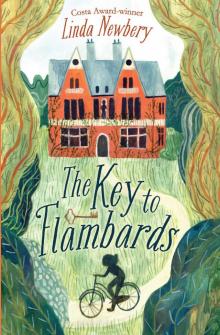 The Key to Flambards
The Key to Flambards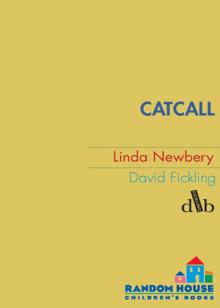 Catcall
Catcall Sisterland
Sisterland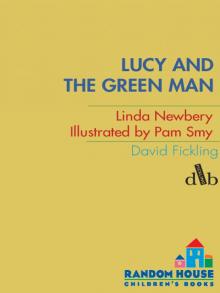 Lucy and the Green Man
Lucy and the Green Man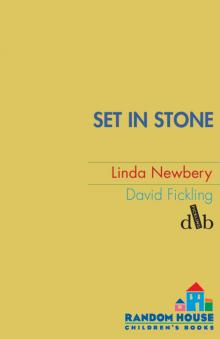 Set In Stone
Set In Stone Lob
Lob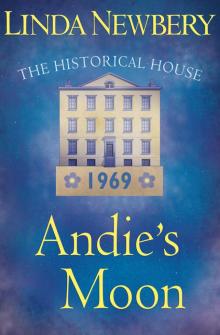 Andie's Moon
Andie's Moon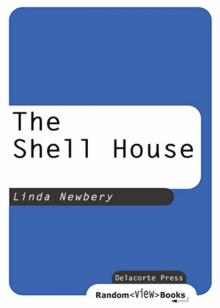 The Shell House
The Shell House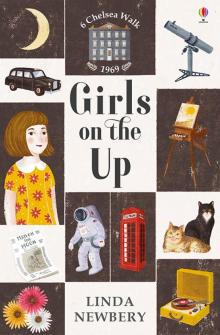 Girls on the Up
Girls on the Up The Sandfather
The Sandfather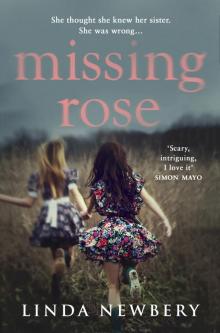 Missing Rose
Missing Rose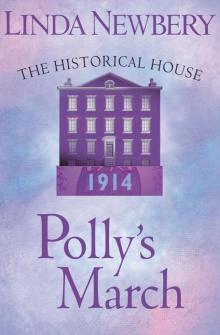 Polly's March
Polly's March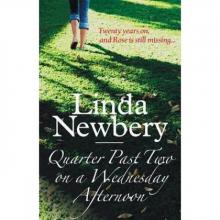 Quarter Past Two on a Wednesday Afternoon
Quarter Past Two on a Wednesday Afternoon Flightsend
Flightsend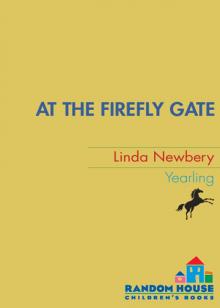 At the Firefly Gate
At the Firefly Gate